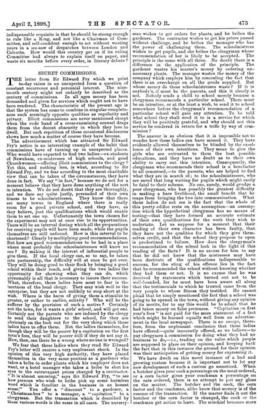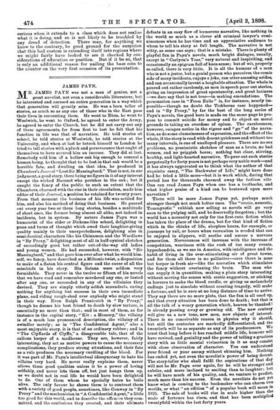SECRET COMMISSIONS. T HE letter from Sir Edward Fry which we
print to-day raises in an unexpected form a question of constant recurrence and perennial interest. The nine- teenth century might not unfairly be described as the century of commissions. In all ages money has been demanded and given for services which ought not to have been rendered. The characteristic of the present age is that the system has come to combine in singular complete- ness such seemingly opposite qualities as regularity and privacy. Illicit commissions are never mentioned except when the rude hand of a cross-examining counsel drags them from the decent obscurity in which they love to dwell. But each repetition of these occasional disclosures shows how much a matter of course they have become.
The advertisement which has attracted Sir Edward Fry's notice is an interesting example of the habit that commissions have of turning up in unexpected places. Who would have expected to find two ladies—ex-students of Newnham, ex-mistresses of high schools, and good Churchwomen—offering illicit commissions to the clergy ? Yet this, and nothing less, is what, according to Sir Edward Fry, and we fear according to the most charitable view that can be taken of the circumstances, they have done in fact. We say "in fact," because we do not for a moment believe that they have done anything of the sort in intention. We do not doubt that they are thoroughly, and we dare say quite justly, persuaded of their own fitness to be schoolmistresses. They know that there are many towns in England where there is really room for a good private school, and they have, as they believe, just the qualifications which would enable them to set one up. Unfortunately the town chosen for the experiment may not at once rise to its opportunities. There will be an interval during which all the preparations for receiving pupils will have been made, while the pupils themselves are still unfound. How is this interval to be shortened? Clearly by multiplying good recommendations. But how are good recommendations to be had in a place where most probably the schoolmistresses will know no one ? By making it the interest of influential people to give them. If the local clergy can, so to say, be taken into partnership, the difficulty will at once be got over. They will be doing good to their flock by bringing a good school within their reach, and giving the two ladies the opportunity for showing what they can do, which presumably is all that is necessary to insure their success. What, therefore, these ladies have most to fear is the inertness of the local clergy. They may wish well to the enterprise, but they are not unlikely to stop short at the wish. Where is the harm of giving them a stimulus to greater, or rather to earlier, activity ? Who will be the sufferer by the provision of such a motive ? Certainly not the town, for it wants a girls' school, and will get one. Certainly not the parents who are induced by the clergy to send their daughters to the school, for they are obviously on the look out for the very thing which these ladies have to offer them. Not the ladies themselves, for though they will be the poorer by a capitation on the first term's fees, they will be poorer still if they do not pay it. How, then, can there be a wrong where no one is wronged?
We fear that these ladies when they read Sir Edward Fry's letter will receive a very unpleasant shock. In the opinion of this very high authority, they have placed themselves in the very same position as a gardener who takes a bribe to order plants which his employer does not want, or a hotel manager who takes a bribe to shut his eyes to the extravagant prices charged by a contractor. "It is almost amusing," says Sir Edward Fry, "to see how persons who wish to bribe pick up some harmless word which is familiar in the business in an honest sense." You offer a " discount " to a gardener, a , ' Christmas-box " to a manager, a "capitation" to a clergyman. But the transaction which is described by these various words is the same in all cases. The nursery- man wishes to get orders for plants, and he bribes the gardener. The contractor wishes to get his prices passed without challenge, and he bribes the manager who has the power of challenging them. The schoolmistress wishes to get pupils, and she bribes the clergyman whose recommendation of her is likely to be accepted. The principle is the same with all three. No doubt there is a difference in the application of the principle. The gardener wastes his master's money by ordering un- necessary plants. The manager wastes the money of the company which employs him by concealing the fact that there is an overcharge on all the goods supplied. But whose money do these schoolmistresses waste ? If it is anybody's, it must be the parents, and this it clearly is not. Nobody sends a child to school merely because a. clergyman recommends a particular school. There must be an intention, or at the least a wish, to send it to school somewhere before the clergyman's recommendation of a particular school will gain any attention. To be told what school they shall send it to is a service for which they will be positively grateful, and why should not this service be rendered in return for a trifle by way of com- mission?
The answer is so obvious that it is impossible not to wonder how these ladies can have missed it. They have evidently allowed themselves to be blinded by the excel- lence of their own intentions. They mean to give the girls who are entrusted to them the best possible educations, and they have no doubt as to their own ability to carry out this intention. Consequently, the clergyman who recommends their school is a benefactor to all concerned,—to the parents, who are helped to find what they are in search of; to the schoolmistresses, who are saved that long waiting for pupils which might easily be fatal to their scheme. No one, surely, would grudge a. poor clergyman, who has possibly the greatest difficulty in making a bare livelihood, the small benefit that he reaps from bringing the two into communication. What these ladies do not see is the fact that the whole of this pretty edifice rests on the assumption—an assump- tion which the hypothetical clergyman has no means of testing—that they have formed an accurate estimate of their own qualifications for the work they wish to undertake. Let us suppose for a moment that their reading of their own character has been faulty, that they have not the qualities for which they give them- selves credit, and that the school they propose to open is predestined to failure. How does the clergyman's recommendation of the school look in the light of this reading of the facts ? It is no excuse for him to say that he did not know that the mistresses may have been destitute of the qualifications indispensable to success, for the sting of his offence lies in the fact that he recommended the school without knowing whether they bad them or not. It is no excuse that he was deceived by statements which turned out not to be well-founded, for he must have been aware all along that the testimonials to which he trusted came from the very people to whose fitness they testified. He cannot plead that he simply mentioned the fact that a school was going to be opened in the town, without giving any opinion of its merits, for to say this would be to admit that he had taken money on false pretences. "Capitation on first year's fees" is not paid for the mere statement of a fact which might be learned equally well from an advertise- ment in the local newspaper. There is no escape, there- fore, from the unpleasant conclusion that these ladies have offered—quite innocently offered, as we believe—to pay clergymen a commission for doing what they had no business to do,—i.e., trading on the value which people are supposed to place on their opinion, and keeping back the fact that in this instance the ground for their opinion was their anticipation of getting money for expressing it.
We have dwelt on this novel instance of a bad and growing custom because it is important not to let any new development of such a custom go unnoticed. When a butcher gives your cook a percentage on the meat ordered, or a corn factor gives your coachman a percentage on the oats ordered, there is no attempt to put any gloss on the matter. The butcher and the cook, the corn factor and the coachman, alike know that secrecy is of the essence of the transaction. If the master finds it out the butcher or the corn factor is changed, the cook or the coachman get notice to leave. The mischief becomes more
serious when it extends to a class which does not realise what it is doing, and so is not likely to be troubled by any dread of detection. There may, for anything we know to the contrary, be good ground for the suspicion that this bad custom is extending itself into regions where we might fairly have looked to see it checked by con- siderations of education or position. But if it be so, that is only an additional reason for nailing the base coin to the counter on the very first occasion of its presentation.



































 Previous page
Previous page